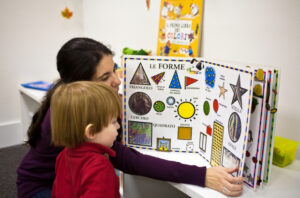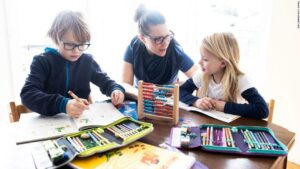Since the World Health Organization declared the novel coronavirus disease, COVID-19, a pandemic, we know that many parents have been wondering how we’ll manage to keep our kids occupied at home for a week or more — without access to amusement parks, play spaces, local libraries and play dates. If you’re lucky, you can stay home with them — while working from home and juggling conference calls at the same time. But if you can’t, hopefully you can find help or set up a system to keep in touch with your kids throughout the day while they’re home alone.
In this article, we provide parents with a bunch of ideas for how to keep our kids busy, entertained, and learning while they’re home. All the way at the bottom, there are plenty of resources so you can pick and choose what works for you and your family. We hope this helps ease the burden of this confusing time.
Quick tips to keep your kids learning
Manage your expectations. Your kids will not be learning at the same pace or breadth as a usual school day. Figure two to three hours a day to start. Don’t stress too much about this.
Make time for breaks and fun. All of us are anxious as we manage this new reality, so take any opportunity to relax and laugh together. It will make the hard stuff easier.
Set a schedule. Get everyone on the same page so you don’t have to nag. Routines can be comforting for everyone.
Review schools’ plans. In most cases, schools will have a very specific education plan during closures. Use their instructions as a guide for setting up your schedule.
5 ways to keep your child academically engaged when stuck at home
#1. Establish a daily routine
A day or two at home might seem like a breeze, but longer stretches may start to get a little challenging. If your kids are away from school or aren’t participating in their normal activities, creating a daily routine will help them feel as normal as possible. Set a daily wake-up time and then block out the day for different sorts of activities like reading, doing house chores, school work, creative play or crafts… Parents should come up with a daily schedule that you hang on the wall for the kids to see. There should be some sort of schedule just like there is at school to keep kids on track with routine and to keep them from falling into too much screen time. If you have a co-parent or another adult living in your home, try setting up a shift schedule so you both get some uninterrupted work time and downtime during the day. While some families prefer to switch on and off by the hour, others prefer designating one parent in charge of mornings and the other in charge of afternoons.
 #2. Find math problems in everyday life
#2. Find math problems in everyday life
If your children are unlikely to spend the day at a desk on their homework, a useful way of engaging them in their learning is by doing real-time interactive activities. Elena Karas, a mother and writer in Monrovia, California, recommends sending kids around the house and having them measure everything in a given size. Each day of the week have them measure everything in the house that is of a particular size — like everything that is one inch long. The next day add an inch and have them find everything that’s two inches long. Increase the size incrementally for each day they are home.
Lori Rosales, a mother of three and educator for Los Angeles Unified School District through UCLA’s math project has tips for finding math everywhere in the house. She charges her three children to count everything in her home. She has the little ones count things one-by-one, but has older, elementary-aged children put items in groups to count. She also has them come up with word problems based on sharing. For example, “If you and your two brothers have 36 mini-figures and you share them equally how many will each get?” Rosales also recommends baking with your child and talking with them about fractions. There are a ton of fun, and easy ways to teach your kids math at home. We have put together a long list of super fun math activities for your kids to help them develop a strong foundation in understanding math, and enhance their interest in learning.
>> Read more at: Playful Math activities for your primary kids.
 #3. Set up reading time
#3. Set up reading time
Regular reading is a stepping stone to better writing and helps kids’ strengthen their writing skills. It helps expand children’s vocabulary and show them different ways of using words. Therefore, make sure you’re reading together every day and encouraging their love of reading as they grow. If your kid has a book they’re reading in English class, make some progress on that. If not, choose one for fun. Introduce children to different genres (types of literature), authors, and writing styles.
Choose books with wonderful language, vocabulary, stories, and information… Parents can refer to our old blog post to learn how to choose a just right book for your child’s reading level.
Since we can’t leave the house given this situation, parents can consider getting e-books so that your kids can access them on their Kindle, tablet, or computer. These days, kids love playing on computers and smart phones, so you may as well put that play to good use and give them some apps that are going to help to improve their reading skills. Below are some great reading apps you can download to help your kids become better readers.
#4. Get artsy
Parents often lament that there isn’t enough art in schools. Take this time to focus on art and see where your child’s creativity takes them. YouTube has an endless amount of instructional content, including music lessons, DIY creators, painting, and more. You can use YouTube tutorials to teach your child how to draw complex characters and animals. All you need to do is just go to YouTube and type something like ‘how to draw a king cobra,’ then your kid will enjoy drawing by herself. This usually kills 30 minutes to an hour. Some parents also plan to use musical learning apps to help their child hone piano-playing skills.
If you’d like to keep the kids offline, bring out the pens and paper! There are terrific process-art handbooks for parents and kids available as well as thematic activity books that can really challenge the imagination and build narrative story-telling skills, or you can find books that help them through the step-by-step process of drawing their favorite characters. It doesn’t take a lot of special materials for kids to have everything they need to get building.
To get them started, fill a basket or box with:
- craft glue
- empty tissue boxes or shoe boxes
- toilet paper rolls or paper towel rolls
- scrap wood
- popsicle sticks
- pipe cleaners
- other household finds
Task your kids with building a city, a town, or something from their own imagination!
#5. Use the internet to your advantage
While your children’s schools may have online options for learning, here are some great learning resources suggested by our teachers. Tony Ngo, our Chairman and Co-founder, said that his son was so into Prodigy Math. “It’s like an online fantasy world where you win quests by doing math problems,” he said. Parents see the results and can assess their children in specific areas without them even realizing they are being tested. “Kids can play with their friends, and it’s safe because an adult makes the “world” and only invites specific people. My kids love it.”
At Everest Education, we love using NewsELA in our English Language Arts to help students practice on reading and writing skills. NewsELA provides a wide range of articles on current events and various topics that can be searched by grade level. We also love Flocabulary, which teaches key ideas on various topics such as math, English, social studies, and puts them to song for better memorization and understanding. Kids really get engaged with these songs, and activities are included with the lessons.
To give you some options, we have compiled two lists of some useful Math and English learning websites, based on recommendations of our teachers to help students self-study and practice Math and English, prepare for examinations such as SAT, ICGSE, IB … or simply have a fun time learning at home.
Being faced with a pandemic is no joke, but if home-school parents can do it every day, most of us can hopefully pull this off—and keep our kids academically on track—for a few weeks.
Reference:
https://www.commonsensemedia.org/blog/how-to-keep-kids-learning-when-theyre-stuck-at-home
https://www.usatoday.com/story/tech/reviewedcom/2020/03/16/9-ways-keep-your-child-academically-engaged-while-stuck-home/5012910002/



 #2. Find math problems in everyday life
#2. Find math problems in everyday life #3. Set up reading time
#3. Set up reading time








